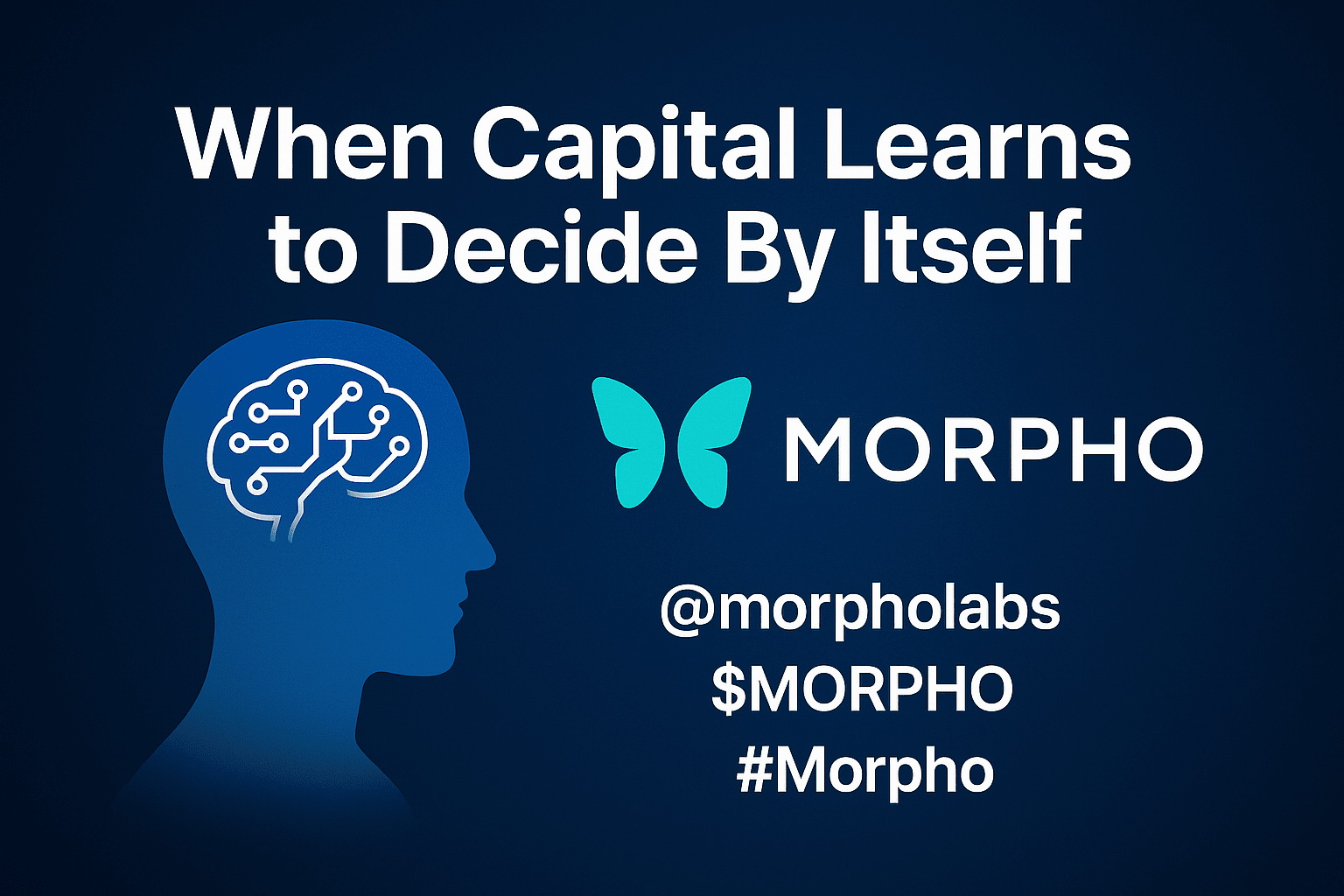Have you ever wondered what would happen if money stopped obeying those who possess it and started obeying the logic of its own movement? It sounds strange, even uncomfortable, but that is where true decentralization begins. The future of finance is not one where a bank disappears and another takes its place; it is where the structure itself decides without asking for permission. That feeling of vertigo, that the old no longer supports the new, is exactly what you feel when you understand @Morpho Labs 🦋 and its radical proposal: to return capital to its mathematical nature, not political, not emotional, not speculative, but programmatic and demonstrable. And that is why the path is not noise, it is precision; that is why $MORPHO does not shout: calculate, adjust, optimize, evolve.

Sometimes I laugh alone —because the market thinks disruption is about doing more aggressive marketing or creating unfounded hype— while the real change happens where almost no one looks: in how risk flows, how collateral is evaluated, how liquidation priority is defined, how capital interacts without a central arbiter. Morpho is not competing for attention; it is competing for structural efficiency. It is a silent but surgical strike at systemic inefficiency. Where others talk, Morpho measures. Where others speculate, Morpho matches real supply and demand. Where others simulate decentralization, Morpho bases it on proofs, not narratives. And that is the part that bothers the old models the most: there is no room for power without responsibility, only for design with coherence proofs.
When one understands that markets are not fights, but equations seeking balance, everything changes. The DeFi that we see today as 'advanced' will seem clumsy in a few years, centralized in their internal logic, with rigid pools and artificial spreads disguised as innovation. Morpho does not wait for the market to mature; it is forcing it to mature. And that always makes people uncomfortable. Efficient capital, verifiable risk, configurable markets, and the craziest part: minimal governance, because when the system works well, it does not need human hands manipulating it. That is tomorrow’s thinking applied today. If today we feel like we are 'early,' at Morpho we are even before the beginning. Because here we are not building an application; we are building a paradigm.
This is the kind of technology that does not seek for you to understand it quickly, but for you to understand it well. And when you do, it changes the way you see finance forever. That’s why anyone reading this and grasping it is facing one of the most intelligent, cleanest, and most inevitable movements of Web3. It is no longer about gaining power within the system; it is about eliminating the very concept of source power. And if it makes you uncomfortable, maybe it’s because we grew up believing that someone had to be in charge. But in this model, in charge are the mathematics.



When capital stops asking for permission to be efficient, when value is captured not from control but from algorithmic coordination, when guarantees are defined by verifiable truth and not by subjective trust, then you will understand that Morpho did not come to compete. It came to quietly replace the ground on which the entire financial system stands.
To understand why Morpho is breaking paradigms, one must analyze its architecture from the right lens: structural efficiency, not UI/UX, not temporary yield farming, not narrative. Morpho operates as an optimization layer on top of already proven liquidity protocols (Aave, Compound in its early stage) but without inheriting their design limitations. Instead of static pools, Morpho matches borrowers and lenders peer-to-peer, reducing friction, increasing efficiency in rates, and eliminating the 'dead rate' that providers currently lose to subsidize obsolete structures. That differential, at scale, is disruption.
Then Morpho Blue appears —and that’s where the game changes completely— because it introduces modular markets where each critical component of credit is parameterizable. Oracles eligible by market, specific collateral, modular risk, on-chain proofs as a central criterion, not DAO speeches. Do you realize what that implies? No more 'one model for all circumstances.' Each market can be built with its own economic structure based on logic, not internal politics. It is literally dismantling DeFi to rebuild it in a purer way.
The result is brutal: credit markets that self-optimize according to real supply and demand, without direct human intervention, without artificial subsidies, without invasive governance. It is the natural evolution of decentralized finance: moving from digital imitations of the traditional banking system to living systems where the structure decides better than any board of directors.
If you want to visualize morphologically the essence of Morpho, see it as a liquidator of the old system. Instead of relying on 'risk committees,' #Morpho uses auditable and verifiable on-chain parameters. This breaks one of the biggest fears of the sector: the political capture of protocols. Minimal governance is not by chance: it is anti-fraud, anti-manipulation, anti-privileged interests design. Markets in Morpho can be configured for different risk levels, different assets, different oracles, different liquidation mechanisms. That is not superficial flexibility; it is modular economic engineering.
And the most interesting thing is that its system incentivizes natural efficiency: if a poorly designed market fails, it fails in isolation. If it works, it thrives and replicates. This is economic evolution applied to code. Liquidity migrates where it finds real efficiency, not better slogans. It is the natural selection of capital. $MORPHO becomes the asset that represents participation in that dynamic equilibrium ecosystem, not arbitrary power.
If you understand what you just read, you know this is not about 'another DeFi narrative.' This is the blueprint for how capital will operate when it finally stops depending on humans to make optimal decisions. Don’t expect the market to reward it today. But when it does, it will be irreversible.
If this analysis opened your mind about how efficiency will rewrite decentralized economics, I invite you to like, quote, and share so that more minds understand why Morpho does not compete in the present —it builds the future that others will have to adopt.
